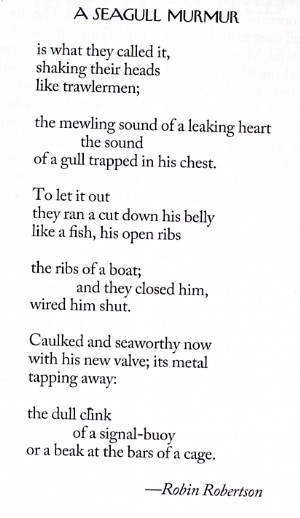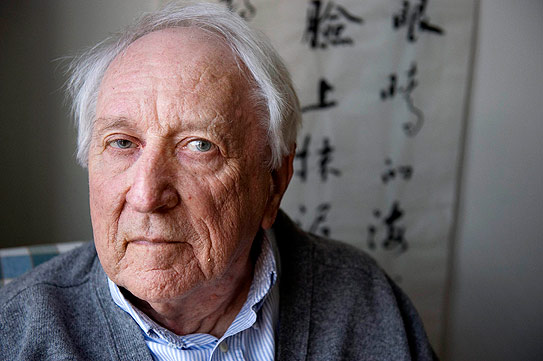 |
 Note: Ông
này là 1 trong những dịch giả thơ TT, và là tác giả bài viết Translating
Tomas Tranströmer, Dịch TT Gấu tính dịch
bài thơ trên, và giữ nguyên cái form của nó trên tờ báo, thay vì scan. Bài thơ của
Gấu cũng có hải âu, cũng có tiếng thì thầm của hải âu, của Gấu, và của
biển TOMAS
TRANSTROMER Here,
the
Greece of islands and ports gives occasion to Swedish poet Tomas
Transtromer for
a descriptive poem which changes into a moral parable.
SYROS In
Syros' harbor abandoned merchant ships lay idle. CAPE
RION, Monrovia. Dark
paintings on the water, they have been hung aside. Like
playthings from our childhood, grown gigantic, XELATROS,
Piraeus. But
when we first came to Syros, it was at night, Translated from the Swedish by May Swenson
and Leif Sjoberg Ở đây, Hy Lạp
của những hòn đảo và bến cảng là dịp để nhà thơ Thụy Ðiển Tomas
Transtromer SYROS Cảng Syros
hoang phế CAPE RION,
Monrovia. Những bức họa
u tối trên mặt nước, chúng được treo một bên. XELATROS,
Piraeus. Nhưng khi chúng
tôi tới Syros lần đầu thì là vào ban đêm. Trên net, tờ Người Kinh Tế có
bài viết về Nobel văn chương năm nay của Prospero. Cái
chi tiết thần kỳ mà Prospero khui ra từ thơ của Tomas Transtromer, [the
Swedish
Academy has praised an oeuvre that is “characterised by economy”], làm
GCC nhớ
tới Brodsky, qua đoạn viết sau đây: Bài
thơ đâu khác chi một giấc mơ khắc khoải,
trong đó bạn có được một cái chi cực kỳ quí giá: chỉ để mất tức thì.
Trong giấc
hoàng lương ngắn ngủi, hoặc có lẽ chính vì ngắn ngủi, cho nên những
giấc mơ như
thế có tính thuyết phục đến từng chi tiết. Một bài thơ, như định nghĩa,
cũng giới
hạn như vậy. Cả hai đều là dồn nén, chỉ khác, bài thơ, vốn là một hành
vi ý thức,
không phải sự phô diễn rông dài hoặc ẩn dụ về thực tại, nhưng nó chính
là thực
tại. Nobel prize
for literature The Swedish
poet you will soon be reading Oct 6th
2011, 18:43 AMID the
flurry of last-minute bets for Bob Dylan (once rated by bookies at
100/1), a
relatively unknown Swedish poet, Tomas Tranströmer, has won the Nobel
prize for
literature. “He is a poet but has never really been a full-time
writer,”
explained Peter Englund, the permanent secretary of the Swedish
Academy, which
decides the award. Though Mr Tranströmer has not written much lately,
since
suffering from a stroke in 1990 that left him partly paralysed, he is
beloved
in Sweden, where his name has been mentioned for the Nobel for years.
One
newspaper photographer has been standing outside his door on the day of
the
announcement for the last decade, anticipating this moment. Tomas
Tranströmer – My Nobel prize-winning hero The literature prize means the world of poetry can finally raise a glass to salute this humble man
Nguyên tác tiếng Anh: Tranströmer's
surreal explorations
of the inner world and its relation to the jagged landscape of his
native country have been translated
into over 50 languages. GCC
dịch: Những
thám hiểm siêu thực [TQ bỏ từ này] thế giới nội tại, và sự
tương quan của
nó [số ít, không phải những
tương quan] với những phong cảnh lởm chởm [TQ bỏ từ
này luôn] của quê hương của ông được dịch ra trên 50 thứ tiếng. Mấy từ quan trọng, TQ đều bỏ, chán thế. Chỉ nội 1 từ
“lởm chởm” bỏ đi, là mất mẹ 1 nửa cõi
thơ của ông này rồi. Chứng cớ: The
landscape of Tranströmer's poetry has remained constant during his
50-year
career: the jagged coastland of his native Sweden, with its dark spruce
and
pine forests, sudden light and sudden storm, restless seas and endless
winters,
is mirrored by his direct, plain-speaking style and arresting,
unforgettable
images. Sometimes referred to as a "buzzard poet", Tranströmer seems
to hang over this landscape with a gimlet eye that sees the world with
an
almost mystical precision. A view that first appeared open and
featureless now
holds an anxiety of detail; the voice that first sounded spare and
simple now
seems subtle, shrewd and thrillingly intimate. [Phong cảnh
thơ TT thì thường hằng trong 50 năm hành nghề thơ: miền đất ven biển
lởm chởm của
quê hương Thụy Ðiển với những rừng cây thông, vân sam u tối, chớp bão
bất thần,
biển không ngừng cựa quậy và những mùa đông dài lê thê, chẳng chịu chấm
dứt, phong
cảnh đó được phản chiếu vào thơ của ông, bằng 1 thứ văn phong thẳng
tuột và những
hình ảnh lôi cuốn, không thể nào quên được. Thường được nhắc tới qua
cái nick
“nhà thơ buzzard, chim ó”, Transtromer như treo lơ lửng bên trên phong
cảnh đó với con mắt gimlet [dây câu bện thép], nhìn
thế giới với 1 sự chính xác hầu như huyền bí, thần kỳ. Một cái nhìn
thoạt đầu có
vẻ phơi mở, không nét đặc biệt, và rồi thì nắm giữ một cách âu lo sao
xuyến chi
tiết sự kiện, tiếng thơ lúc đầu có vẻ thanh đạm, sơ sài, và rồi thì
thật chi li,
tế nhị, sắc sảo, và rất ư là riêng tư, thân mật đến ngỡ ngàng, đến sững
sờ, đến
nghẹt thở.] Chỉ đến khi ngộ ra cõi thơ, thì Gấu mới hiểu ra là, 1 Nobel văn chương về tay 1 nhà thơ là 1 cơ hội tuyệt vời nhất trong đời một người… mê thơ. Người ta thường
nói, thời của anh mà không đọc Dos, đọc Kafka… thí dụ, là vứt đi, nhưng
không được
nhìn thấy 1 nhà thơ được vinh danh Nobel thì quả là 1 đại bất hạnh! Thành thử, Gấu
rất bực vị sư phụ tiếng Anh của Gấu, khi bà khăng khăng không chịu dịch
thơ, không
thích đọc thơ dịch, không… thơ, tuy bà là 1 nữ thi sĩ rất ư là khiêm
nhường với
những bài thơ khiêm nhường của bà. Câu chuyện
sau đây, thật thi vị, thật tuyệt vời, và lẽ tất nhiên, vì thật thi vị,
thật tuyệt
vời cho nên, thật.. sến, và vào những ngày đầu năm, thật quá đắc địa để
mà kể
ra, bởi vì nó đẹp như là những lời chúc mừng ngày đầu năm vậy. Thơ, ngôn ngữ của đam mê? The
literature prize means the world of poetry can finally raise a glass to
salute this
humble man: Tuyệt. "No
poet expresses better the relationship between humans and the natural
world.
The black and melancholy seas, the drifting seagulls, the oaks and
elks, the
storms, rowanberries, the moon and stars, the well, salt, and wolves
are agents
rather than background; they are what the world is, as much as we are.
It's
dark, and thoughtful. It is, also, bleakly intelligent."
TOMAS
TRANSTROMER Here, the
Greece of islands and ports gives occasion to Swedish poet Tomas
Transtromer SYROS In Syros'
harbor abandoned merchant ships lay idle. CAPE RION,
Monrovia. Dark
paintings on the water, they have been hung aside. Like
playthings from our childhood, grown gigantic, XELATROS,
Piraeus. But when we
first came to Syros, it was at night, Translated
from the Swedish by May Swenson and Leif TOMAS TRANSTROMER A
transformation of the landscape, and awareness of the alienation of man
OUTSKIRTS Men in
overalls the same color as earth rise from a ditch. Translated
from the Swedish by Robert Bly TOMAS
TRANSTROMER 1931- This poem by
Transtromer is the most literally spoken in the now, and it's so
impressive
that we forget to ask when-how long ago-the observer lived through it.
It's
like a snapshot, though enriched by things known from the past, in a
dream or
during illness. TRACKS Night, two
o'clock: moonlight. The train has stopped As when
someone has gone into a dream so far And as when
someone goes into a sickness so deep The train
stands perfectly still. Translated
from tire Swedish by Robert Bly
A poem by
the 2011 Nobel prize for literature winner One evening
in February I came near to dying here. My name, my
girls, my job The approaching
traffic had huge lights You could
almost pause Then
something caught: a helping grain of sand Then –
stillness. I sat back in my seat-belt II I have been
walking for a long time In other
parts of the world To be always
visible – to live The
murmuring rises and falls Everyone is queuing at everyone's door. Many. One. |
